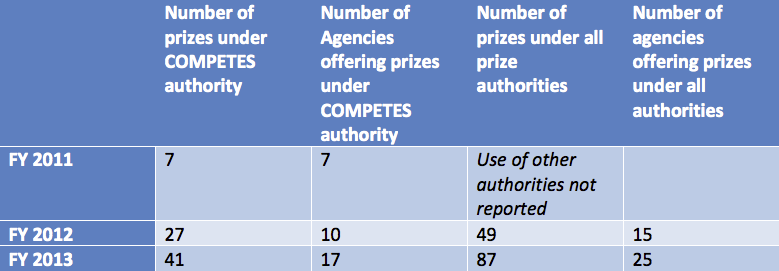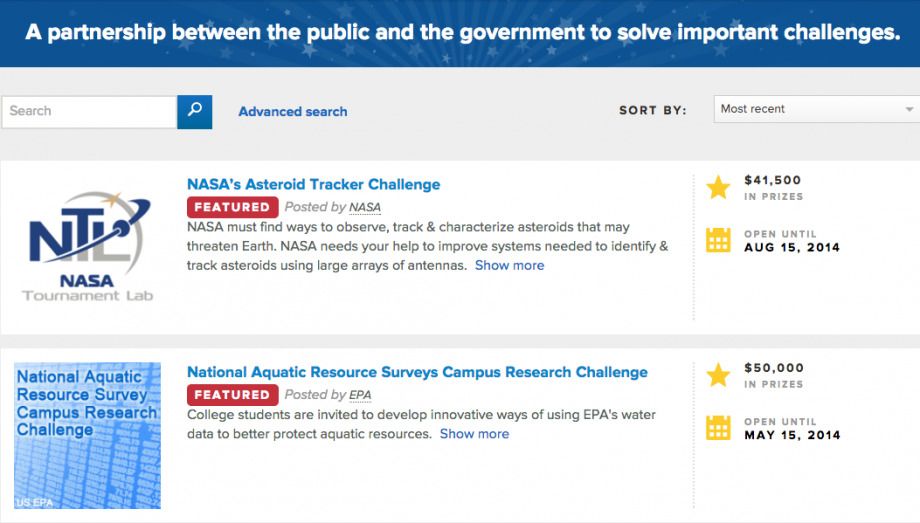At the very start of 2011, President Obama signed a reauthorization of the America COMPETES Act that did something special and new: It expanded the authority that federal agencies have to hold contests in which sometimes sizable amounts of money are exchanged for solutions to tough problems, a la the Ansari X Prize or the Oil Cleanup X Challenge. Now a few years in, the White House’s Office of Science and Technology is out with a progress report on how well the public sector has taken to the prize model. In short, the White House says that things are going well, or at least trending strongly in the right direction.
Among the positive signs: The number of prizes offered is multiplying, and the money associated with them is increasing. Of the 68 competitions run under the law’s authority, a full 41 came last year. That said, some two dozen of those were from the behemoth Department of Health and Human Services, so perhaps the statistic more critical to the future of the program is that the total number of agencies offering contests under COMPETES went from 10 in 2012 to 17 in 2013.
More qualitatively, federal agencies are beginning to tackle more ambitious challenges. In the early days, the First Lady’s healthy recipe challenge was one of only a few options. Now, the Department of Energy is offering $10 million to whoever can “make it faster, easier, and cheaper to install rooftop solar energy systems,” part of a grand strategy to make energy from the sun competitive with fossil fuels by 2020.
The appeal of the prize model for agencies at all levels is in that tethered ambition: putting limited sums of money behind potentially huge benefits. The thinking also has been that outsiders of all stripes are more willing to throw themselves into public sector projects if the rules are clear and a finish line is in sight.
The full utility of these challenges, though, has to take into account what they do to change how the federal government works, and there are signs that COMPETES wasn’t just legally freeing but has inspired agencies to get into the contest game across the board. The number of prizes offered under non-COMPETES authorization increased from 39 prizes from five agencies in 2012 to 70 prizes from eight agencies in 2013.
That suggests a cultural shift. The notion of prizes seems to be creeping into the bloodstream of the federal government.

(Credit: White House Office of Science and Technology Policy)
That’s not to say there aren’t challenges with the model.
COMPETES was meant to encourage the federal government to embrace the tech sector mantra of failing fast and often, while outsourcing much of the risk to the private sector. “Pay only for success,” the report reads, “and establish an ambitious goal without having to predict which team or approach is most likely to succeed.” (As an aside, that’s a line that might raise, if not a red flag, then a pink one: There’s a risk that the contest model is used by the desperate agency just to get around the woes of federal contracting, which requires paying for potential and work committed, not just results.)
In that vein, the White House reports as a success story the Department of Defense’s “Defense Threat Reduction Agency’s $1,000,000 Algorithm Challenge,” which aimed “to develop algorithms capable of both quickly and accurately characterizing complex genomic samples by using only raw DNA sequence data and identifying each organism present in a mixed sample,” something the White House’s science office assures is “a very difficult algorithmic challenge.” And after much trial and error, a team of two bioinformaticians and a computer science grad student eventually took home the million.
The winning team’s diversity is a good thing, because these contests are meant to break down silos and encourage the public to get together in teams of various formations. But the DTRA Challenge hit some rough spots. Participants criticized it for being poorly designed, confusing and unnecessarily opaque. Even the leader of the winning team, not swayed by the portion of one million dollars now in his coffers, called the contest’s scoring scheme “delicate.” In the outside world, such trials might well serve as a guide to how to do better next time. Inside the federal government, those learning experiences have tended to be treated as public failures to be avoided at all costs.
How the DTRA Challenge is now thought of in the halls of the Defense Department, not to mention those of the White House — An embarrassing failure! The cost of being in the prize business! — might be the best indicator yet of whether government “prizes” have a chance at making it. And the fact that it’s spotlighted as one of the most intriguing contests last year suggests that they’re just fine with how it went.

Nancy Scola is a Washington, DC-based journalist whose work tends to focus on the intersections of technology, politics, and public policy. Shortly after returning from Havana she started as a tech reporter at POLITICO.








